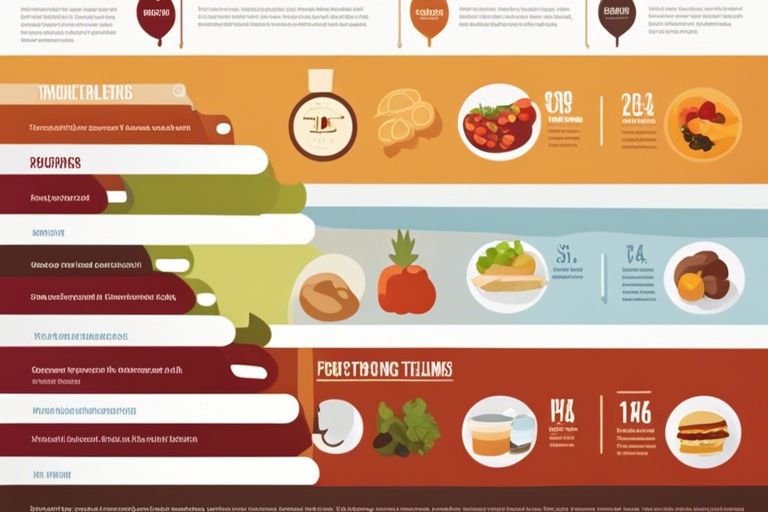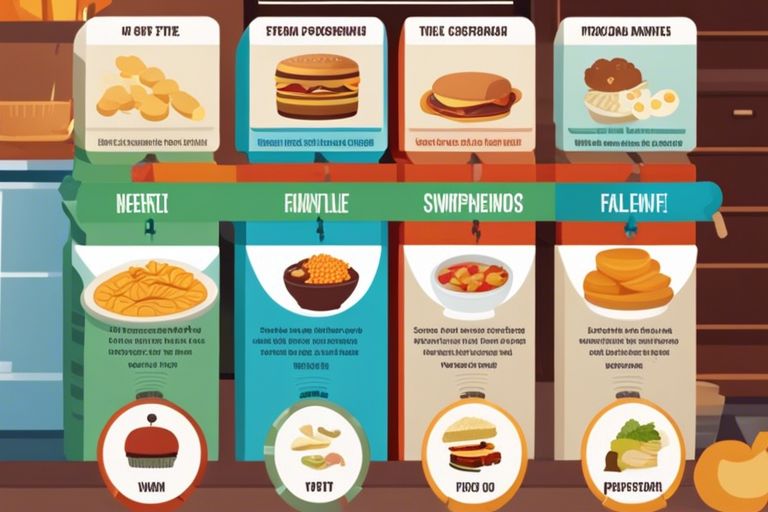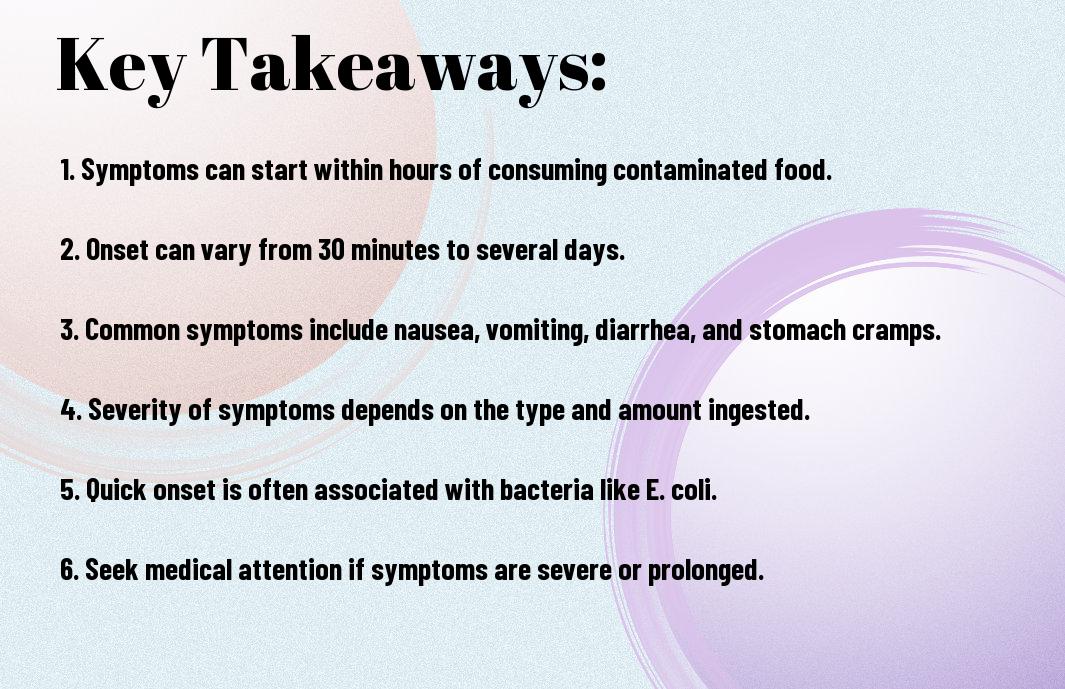Most of the time, you may not realize you have food poisoning until it’s too late. Food poisoning can hit you suddenly and unexpectedly, leaving you feeling ill within a few hours of consuming contaminated food. In this informative blog post, we will explore into the details of how quickly food poisoning starts, its common symptoms, and what you can do to prevent it from ruining your next meal.
Key Takeaways:
- Symptoms can start within hours: Food poisoning symptoms can begin anywhere from 1-48 hours after consuming contaminated food.
- Dependent on the type of bacteria: The timing of food poisoning symptoms can vary depending on the specific type of bacteria or pathogen involved.
- Quick action is important: It is important to seek medical attention promptly if you suspect food poisoning, as early treatment can help alleviate symptoms and prevent complications.
What is Food Poisoning?
While How Long Until Food Poisoning Takes Effect? may vary depending on the type of bacteria or virus involved, food poisoning is typically characterized by symptoms like nausea, vomiting, diarrhea, and stomach cramps, and can range from mild discomfort to severe illness. It is caused by consuming contaminated food or beverages that are tainted with harmful bacteria, viruses, parasites, or toxins. Food poisoning is usually diagnosed based on the onset of symptoms after consuming the contaminated food.
Definition and Causes
Any food can become contaminated if it is not handled, stored, or cooked properly. The most common causes of food poisoning include improper food handling, inadequate cooking temperatures, cross-contamination between raw and cooked foods, and consuming food past its expiration date. Bacteria like Salmonella, E. coli, and Campylobacter are some of the most common culprits behind food poisoning cases.
Common Types of Food Poisoning
With a wide variety of bacteria and viruses that can cause food poisoning, it’s important to be aware of the common types and their symptoms. Some of the most prevalent types of food poisoning include:
- E. coli: Typically found in undercooked ground beef, unpasteurized dairy products, and contaminated water.
- Salmonella: Often present in raw poultry, eggs, and vegetables contaminated by animal feces.
- Norovirus: Commonly spread through contaminated food or water and can cause outbreaks in crowded places like cruise ships or daycare centers.
- Listeria: Found in ready-to-eat deli meats, unpasteurized dairy products, and some soft cheeses.
- Campylobacter: Usually linked to undercooked poultry, unpasteurized milk, and contaminated water sources.
Any delay in seeking medical treatment for severe cases of food poisoning can lead to dehydration, electrolyte imbalances, and other serious complications. It’s crucial to stay hydrated and seek medical attention if you experience severe or persistent symptoms.
The Incubation Period
What is the Incubation Period?
Now, let’s talk about the incubation period of food poisoning. This is the time that elapses between consuming contaminated food or drink and the appearance of symptoms. The length of the incubation period can vary depending on the type of pathogen involved, ranging from a few hours to several days.
Factors Affecting the Incubation Period
On average, the incubation period for most cases of food poisoning is between 6 to 72 hours. However, several factors can influence this timeframe, including the type and amount of the pathogen ingested, your age, overall health, and the strength of your immune system.
- The type and strain of the contaminant
- Your individual sensitivity to the pathogen
- The health of your digestive system
Incubation periods can also be influenced by whether the contaminant produces toxins or multiplies in your body. After ingestion, some pathogens quickly release toxins that result in rapid onset of symptoms, while others take time to multiply within your system before causing noticeable effects.
Understanding the Incubation Period
Incubation periods can provide valuable clues for identifying the source of food poisoning. By knowing the typical timeframe for certain pathogens, you can better pinpoint which meal or food item may have been the culprit. After all, understanding the incubation period is key to unraveling the mystery of when and how food poisoning started.
- Your immune response and ability to fight off the pathogen

Symptoms of Food Poisoning
Despite Symptoms of Food Poisoning | Food Safety, it’s crucial to be aware of the signs that may indicate you are suffering from food poisoning. The symptoms can vary depending on the type of contaminant and the amount consumed.
Common Symptoms
An episode of food poisoning typically presents with common symptoms such as nausea, vomiting, diarrhea, abdominal pain, and fever. These symptoms can manifest within hours of consuming contaminated food, and they may vary in severity based on the individual’s sensitivity to the toxin. It’s crucial to stay hydrated and seek medical attention if these symptoms persist or worsen.
Severe Symptoms
Any severe symptoms of food poisoning, such as persistent vomiting, high fever, severe dehydration, blood in your vomit or stools, and difficulty breathing, require immediate medical attention. In severe cases, food poisoning can lead to complications that may pose a serious threat to your health. It’s crucial not to ignore these warning signs and seek professional help promptly.
Severe symptoms of food poisoning can indicate a more serious underlying condition that requires medical intervention. If you experience any of these severe symptoms, do not hesitate to contact a healthcare provider or visit the nearest emergency room for evaluation and treatment.
Delayed Symptoms
Common delayed symptoms of food poisoning may include fatigue, muscle aches, and headache. These symptoms may not appear until hours or even days after consuming contaminated food, making it challenging to pinpoint the exact source of the illness. If you experience these delayed symptoms after consuming questionable food, it’s crucial to monitor your condition and consult a healthcare provider if necessary.
To ensure your well-being and prompt treatment, it’s crucial to be vigilant about any symptoms of food poisoning and seek medical advice if you have concerns about your health. Remember that early detection and proper intervention can significantly impact the outcome of foodborne illnesses.
How Quickly Do Symptoms Appear?
Rapid Onset Food Poisoning
On average, symptoms of rapid onset food poisoning can appear within 30 minutes to 6 hours after consuming contaminated food. This type of food poisoning is often caused by bacteria like Staphylococcus aureus or Bacillus cereus, which produce toxins that lead to quick onset symptoms such as nausea, vomiting, and stomach cramps.
Delayed Onset Food Poisoning
Delayed onset food poisoning, on the other hand, can take anywhere from 6 hours to a few days for symptoms to manifest. This type of food poisoning is commonly caused by bacteria like Salmonella, Campylobacter, or Escherichia coli (E. coli). These bacteria need time to multiply in the digestive tract before causing symptoms like diarrhea, fever, and abdominal pain.
Delayed onset food poisoning can be particularly challenging as the source of contamination may not be immediately obvious. It’s important to remember what you ate in the days leading up to the onset of symptoms to help identify the potential culprit.
Factors Influencing Symptom Onset
- Types of pathogens present in the contaminated food
- The amount of contaminated food consumed
- Your overall health and immune system
Factors like the type of bacteria present, the quantity of contaminated food ingested, and your individual health status can all influence how quickly symptoms of food poisoning appear. After ingesting contaminated food, these factors can determine the severity and onset of your symptoms.
Symptoms of food poisoning can vary widely depending on the specific pathogen involved and individual factors, so it’s important to pay attention to any signs of illness after consuming questionable food.

Food Poisoning Risks and Vulnerable Groups
Many factors can increase the risk of food poisoning, especially for vulnerable groups. These high-risk groups include young children, elderly individuals, pregnant women, and people with weakened immune systems. For these individuals, experiencing food poisoning can lead to more severe symptoms and complications, making it crucial to take extra precautions when handling and preparing food.
High-Risk Groups
Vulnerable populations such as young children, the elderly, pregnant women, and individuals with compromised immune systems are more susceptible to the effects of foodborne illnesses. For example, a child’s immune system is still developing, making them more vulnerable to harmful bacteria present in contaminated food. Likewise, elderly individuals may have weakened immune systems, which can delay their body’s response to foodborne pathogens, leading to more severe symptoms. Pregnant women need to be particularly cautious as certain foodborne illnesses can harm the developing fetus. Individuals with medical conditions that weaken the immune system, such as cancer patients undergoing treatment, are also at higher risk of complications from food poisoning.
Food Handling and Preparation Risks
The way you handle and prepare food can also affect the risk of food poisoning. Ensuring proper hygiene practices, such as washing your hands before and after handling food, and using separate cutting boards for raw meat and produce, can help reduce the risk of contamination. Additionally, cooking food to the appropriate temperature and storing leftovers properly can prevent the growth of harmful bacteria that can cause foodborne illnesses.
Handling food safely is crucial in preventing food poisoning. By following basic food safety guidelines, such as washing fruits and vegetables, cooking meat thoroughly, and refrigerating leftovers promptly, you can reduce the risk of foodborne illnesses and protect yourself and your loved ones.
Prevention and Treatment
Preventing Food Poisoning
With proper food handling and preparation, you can significantly reduce the risk of food poisoning. Always wash your hands before handling food and make sure to cook meats thoroughly. Keep raw meats separate from ready-to-eat foods to avoid cross-contamination. Refrigerate leftovers promptly and be cautious of expiration dates on food products.
Treating Food Poisoning
An important step in treating food poisoning is staying hydrated. Drink plenty of fluids to prevent dehydration caused by vomiting and diarrhea. You can also try eating bland foods like crackers or toast to settle your stomach. In more severe cases, over-the-counter medications may help alleviate symptoms, but be sure to consult a medical professional first.
Food poisoning usually resolves on its own within a few days. However, if symptoms persist or worsen, it is important to seek medical attention to rule out any complications or more severe underlying causes. Your doctor may recommend specific treatments or medications depending on the type of food poisoning you have.
When to Seek Medical Attention
To determine when to seek medical attention for food poisoning, monitor your symptoms closely. If you experience high fever, severe dehydration, bloody stools, or persistent vomiting that doesn’t improve, it is crucial to contact a healthcare provider. Certain populations such as young children, the elderly, and pregnant women should be especially vigilant and seek medical help promptly if they suspect food poisoning.
Prevention is key when it comes to food poisoning. By practicing safe food handling techniques and being cautious of food quality, you can reduce the risk of falling ill from contaminated food. Remember to follow proper hygiene practices and store food correctly to enjoy meals without the worry of food poisoning.

Conclusion
Following this exploration of how quickly food poisoning can start, it is crucial to remember that symptoms can vary depending on the type of bacteria or toxin involved. It is important to pay attention to any signs of food poisoning, such as nausea, vomiting, diarrhea, and stomach cramps, and seek medical attention if symptoms worsen or persist.
Do not forget, food safety is paramount in preventing food poisoning. Be mindful of proper food storage, cooking temperatures, and hygiene practices in the kitchen. By taking precautions and being aware of the potential risks, you can reduce the chances of experiencing the unpleasant effects of food poisoning.
Q: How quickly does food poisoning symptoms start to appear?
A: Symptoms of food poisoning can start as soon as a few hours after consuming contaminated food, but they may also take days or even weeks to appear. The time it takes for symptoms to develop largely depends on the type of bacteria or virus that has caused the food poisoning.
Q: What are the common symptoms of food poisoning?
A: Common symptoms of food poisoning include nausea, vomiting, diarrhea, stomach cramps, fever, and headache. In more severe cases, symptoms may also include blood in the stool, dehydration, and muscle weakness.
Q: How long does food poisoning usually last?
A: The duration of food poisoning can vary depending on the individual, the type of contaminant, and the severity of the infection. In most cases, food poisoning resolves within a few days to a week. However, in severe cases, symptoms can persist for several weeks. It is important to stay hydrated and seek medical attention if symptoms worsen or do not improve.